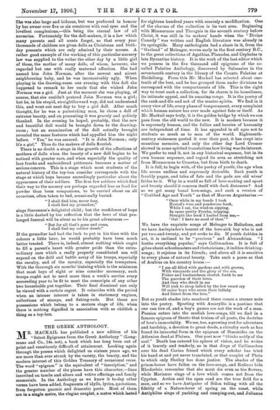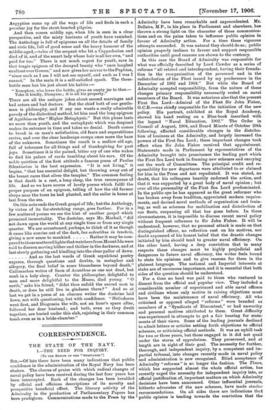THE GREEK ANTHOLOGY.
MR. MACKAIL has published a new edition of his "Select Epigrams from the Greek Anthology " (Long- mans and Co., 14s. net), a book which has long been out of print and vexatiously difficult of attainment. Looking again through the poems which delighted us sixteen years ago, we are more than ever struck by the variety, the beauty, and the modern interest of this Golden Treasury of occasional verse. The word "epigram" is the equivalent of "inscription," and the greater number of the pieces have this character,—lines inscribed on tombs and altars and votive offerings and family memorials. In the Anthology as we know it to-day other verses have been added, fragments of idylls, lyrics, (potations, from forgotten 'gnomic and dramatic poets. Most of them are in a single metre, the elegiac couplet, a metre which lasted
for eighteen hundred years with scarcely a modification. One of the charms of the collection is its vast area. Beginning with Mimnermus and Theognis in the seventh century before Christ, it was still in its makers' bands when the "
Comedy" was written and English literature was already iu its springtide. Many anthologists had a share in it, from the "Garland" of Meleager, woven early in the first century B.C., to the great collections of Agathias, Planudes, and Cephalas in late Byzantine history. It is the work of the last editor which we possess in the five thousand odd epigrams of the so- called Palatine Anthology, discovered by Salmasius in the seventeenth century in the library of the Counts Palatine at Heidelberg. From this Mr. Mackail has selected about one- tenth of the best, and he has grouped them under divisions to correspond with the compartments of life. This is the right way to treat such a collection; for its charm is its homeliness, its intimate appeal, and its amazing range. It is the poetry of the rank-and-file and not of the master-spirits. We find in it every view of life, every phase of temperament, every complaint which human nature has ever made against fate or itself. As Mr. Mackail says truly, it is the golden bridge by which we can pass from the old world to the new. It is modern because it is supremely human, and the follies and heroics of humanity are independent of time. It has appealed in all ages not to students so much as to men of the world. Eighteenth- century statesmen quoted it over their port, it has crept into countless memoirs, and only the other day LordCromer
interest.
We in some spirited translations how living was its nterest. We prefer to read it, not in any historical sequence, but in its own human sequence, and regard its area as stretching not from Mimnermus to Cometas, but from birth to death.
It is full, to begin with, of the poetry of youth; the age when life seems endless and supremely desirable. Such youth is frankly pagan, and tales of fate and the gods are old wives' fables to it. Why in a world so full of love-making and sport and beauty should it concern itself with dark distances P And so we get many banal love-songs, and such a version of " Crabbed Age and Youth" as that of Marcus Argentarius :—
" Once while in my hands I took Hesiod's wise and ponderous book, While I sat, the wisdom sipping, In came pretty Pyrrha, tripping. Straight the book I hurled from me,— `Out! ! I have no need of thee.' " We have the exquisite songs of Meleager to Heliodora, and we have Asclepiades's lament of the love-sick boy who is not yet two-and-twenty, and yet seeks to die. If youth dabbles in art, it is inclined to be " precious " and Alexandrian. "I loathe everything popular," says Callimachus. It is full of gibes about schoolmasters and rhetoricians ; it indites drink ing- songs ; it rejoices in its friends; and above all it is sensitive to every phase of natural beauty. Take such a poem as that of Arabius on his country house :— " I am all filled with gardens and with groves,
With vineyards and the glory of the sea.
Fisher and husbandman stretch forth to me The guerdon of their loves. And they who dwell in me
Will sink to sleep lulled by the low sweet cry
Of sailor boys who croon their lullaby
And linnet from the tree."
But as youth shades into manhood there comes a sterner note into the poetry. Sporting with Amaryllis is a pastime that one can tire of, and a boy's games are not the work of a man. Passion enters into the modish love-songs, till we find in a famous epigram of Strato that truism of all poets, the doctrine of love's immortality. We see, too, a growing zest for adventure and hardship, a devotion to great deeds, a chivalry such as has found its immortal form in the epigram of Simonides on the Athenian dead at Plataea. Our poet now " thinks nobly of the soul." Death has entered his sphere of vision, and he writes of it bravely and tenderly, as in that dirge of Callimachus over his dead Carian friend which every scholar has tried his hand at and yet never translated, or that couplet of Plato to which only Shelley has done' justice. The shades of the prison-house have fallen on the love-songs, and Rufinus bids Rbodocleia remember that she must die even as the flowers, while Marianas sings of a love which comes not from the Cyprian. Action and the open road are the true field for a man, and so we have Antipater of Sidon telling with all the fidelity of a Nature-lover of spring on the coast, while Antiphilua sings of yachting and camping-out, and Julianne
Aegyptins sums up all the ways of life and finds in each a peculiar joy for the stout-hearted pilgrim.
And then comes middl9 age, when life is seen in a clear perspective, and the misty horizons of youth have vanished.
The Anthology is full of epigrams on all the details of family and civic life, full of good sense and the heavy humour of the middle-aged,—tales of the serpent who bit a Cappadocian and
died of it, and of the smart lady whose hair is all her own, "and paid for too." There is not much regret for youth, save in that tragic epigram of the decayed beauty who " once laughed exultant over Greece," and now gives her mirror to the Paphian, "since such as I am I will not see myself, and such as I was I cannot." In the main it is a self-satisfied epoch. The three- bottle man has his jest about his habits:—
"Xenophon, who loves the bottle, gives an empty jar to thee.— Take it kindly, Dionysus ; it is all his property."
There are all the antique jokes about second marriages and bad actors and bad doctors. But the chief butt of our gentle- man is philosophy, and if any one wants a really admirable parody of the dialectical method, let him read the long epigram of Agathias on the " Higher Metaphysic." But this phase lasts no more than youth, and the metaphysic which was despised makes its entrance in time and takes no denial. Death comes to break in on man's satisfaction, old fears and superstitions revive, and over the clear landscape creeps once more the haze of the unknown. Sometimes the result is a mellow old age, full of tolerance for all things and of thanksgiving for past joys. Sometimes it is the pained, bitter cry of one who wakes to find his palace of cards tumbling about his ears. Of the noble quietism of the first attitude a famous poem of Paulus Silentiarius is the best expression. " It is not living," it begins, " that has essential delight, but throwing away out of the breast cares that silver the temples." The common feeling is that death is a rest, a long sleep, the true recompense of life. And so we have scores of lovely poems which fulfil the proper purpose of an epigram, telling of how the old farmer sleeps near the trees he had planted, and the sailor is home at last from the sea.
On this note ends the Greek gospel of life; but the Anthology, by virtue of its far-stretching range, goes further. For in a few scattered poems we see the hint of another gospel which promised immortality. The doctrine, says Mr. Mackail, " did not dawn upon the world at any single time or from any single quarter. We are accustomed, perhaps, to think of it as though it came like sunrise out of the dark, tux sedentibus in tenebris, giving a new sense to mankind Rather it may be com- pared to those scattered lights that watchers from Mount Ida were said to discern moving hither and thither in the darkness, and at last slowly gathering and kindling into the clear pallor of dawn.
And so the last words of Greek sepulchral poetry express, through questions and doubts, in metaphor and allegory, the final belief in some blessedness beyond death." Callimachus writes of Saon of Acanthus as one not dead, but sunk in a holy sleep. Crantor the philosopher, delightful to men and more delightful to the Muses, died young. " 0 earth," asks his friend, " didst thou enfold the sacred man in death, or does he still live in gladness there P " And so at last we get in a poem of an obscure writer the doctrine laid down, not with questioning, but with confidence. " Heliodorus went first, and Diogeneia the wife, not an hour's space after, followed her dear husband ; and both, even as they dwelt together, are buried under this slab, rejoicing in their common tomb even as in a bride-chamber."



























































 Previous page
Previous page